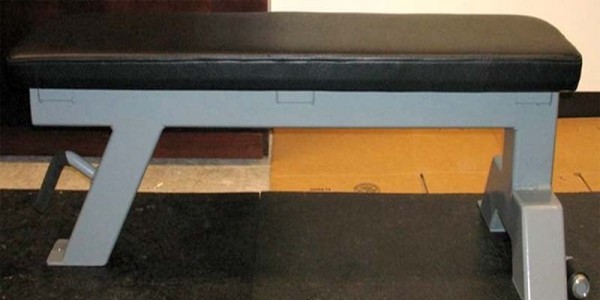Table of Contents
Introduction
These flat utility benches are meant for use either with dumbbells or with a separate rack/cage for doing freeweight barbell exercises.
The advantage of such a bench over a weight bench with an attached rack is the ability to move the bench out to do dumbbell work or to get the bench out of the way to do squats and other exercises with the rack.
Typically, flat benches have no weight limit provided by the manufacturers. We have asked in the past, and usually we were told that basically there is no limit as far as what load a human could put on it.
Flat benches made with 14 gauge steel tend to have weight limits of 500 lbs or so. Even then, the limits are more for liability reasons and are understated, so they won’t fail at 500 lbs, so consider how much weight a 12 gauge bench can really take. If you want the strongest bench, we recommend something with an 11 gauge frame, as described further below.
Rep Fitness is unique in that they actually have an ASTM certified weight rating for their AB-3000 bench of 1000 lbs. That rating is expensive to obtain. They have not yet gotten an ASTM for their even more heavy duty AB-5000 competition bench, but it’s gonna be higher if or when they do it.
All flat utility benches have a plywood backing. The vinyl upholstery is either stapled to the plywood underneath or stitched together in place around the plywood.
Overview chart of the best flat benches
| Model | Height | Steel Gauge | Pad Size | Padding | Price |
|---|---|---|---|---|---|
| Rogue | 18″ | 11 gauge | 12″ x 48″ | 2.25″ | $179.50 |
| Rep FB-5000 | 17″ | 11 gauge | 12″ x 48″ | 4″ | $209.99 |
| Rep FB-3000 | 17.5″ | 11 gauge | 12″ x 47″ | 2.5″ | $149.99 |
| Fringe | 17.5″ | 11 gauge | 13″ x 47″ | 2″ | $175.00 |
| Valor DA-6 | 16″ | 11 gauge | 11″ x 43″ | 2.75″ |
$172.99 |
| York STS 55026 | 19″ | 11 gauge | 10″ x 40″ | 2.4″ | $189.00 |
| American Barbell | 18″ | 11 gauge | 12″ x 48″ | 2.5″ | $235.00 |
Why I picked these benches
The right steel
The gauge (thickness) of steel used in the frame makes a difference in how much the steel can flex under a very heavy load, and how solid it feels. The smaller the number, the thicker the steel, and the more heavy duty and stable the bench is.
There are many 12 gauge steel framed benches out there. For a bump up to an 11 gauge bench of otherwise the same quality, the price difference is very small. These flat benches I’m featuring here are not expensive, considering you’re getting in many cases a commercial quality bench.
Appropriate height
If you’re competing, the IPF requires a competition bench to be between 16.5″ and 17.7″ high. This is measured to the top of the bench pad.
Shorter lifters will definitely want a shorter bench, 18″ or shorter, so that their feet remain solidly planted on the floor for stability. But taller people often appreciate a short bench too, for the added stability and not having to arch their back as much… unless they’re doing the typical arched-back powerlifting form. In any case, lifters training for strength or muscle only should not be arching their back like this.
Pad size
Tall users with a long torso may want a longer bench. For most people the length doesn’t matter. IPF regulation length is 48″ minimum.
The pad width is a compromise between stability and not interfering with your shoulders’ range of motion during presses. So people with wide shoulders can make good use of a wider bench. IPF regulation size is between 11.5″ and 12.5″ wide.
Padding quality
Lower quality benches made for home use are made with soft foam padding, because it’s cheap.
All of the flat benches featured here are made with some combination of EVA or high density foam, for a firm but comfortable pad that feels like a good bench you will find in a commercial gym. A 2″ pad should never bottom out on most people, but a 2.5″ or thicker pad will help stronger lifters feel more confident that heavy weight will never be an issue and the padding will feel solid even under your max lifts.
Top Picks
(under construction 1/17/18)
Rep Fitness FB-3000
Rep Fitness offers the FB-5000 model also, which is made to competition-spec for people who want a bench that is sized the same as anything they will compete on.
All-welded benches don’t use any bolts to keep the frame together, so there’s no danger of a bolt loosening over time and causing it to become unstable. Still, a properly engineered bolted design should never be a problem if the bolts are tightened properly. And a welded bench is more expensive to ship because it can’t be broken down, so that’s reflected in the product price.

